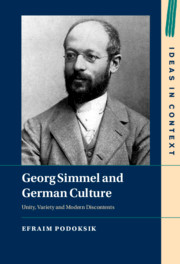Book contents
- Georg Simmel and German Culture
- Ideas in Context
- Georg Simmel and German Culture
- Copyright page
- Contents
- Acknowledgements
- Note on Translations and References
- Introduction
- Chapter 1 Bildung, Kultur, Crisis
- Chapter 2 Unity in Variety
- Chapter 3 Unity versus Variety
- Chapter 4 Unity above Variety
- Conclusion
- Bibliography
- Index
Chapter 4 - Unity above Variety
Published online by Cambridge University Press: 07 July 2021
- Georg Simmel and German Culture
- Ideas in Context
- Georg Simmel and German Culture
- Copyright page
- Contents
- Acknowledgements
- Note on Translations and References
- Introduction
- Chapter 1 Bildung, Kultur, Crisis
- Chapter 2 Unity in Variety
- Chapter 3 Unity versus Variety
- Chapter 4 Unity above Variety
- Conclusion
- Bibliography
- Index
Summary
This chapter analyses Simmel’s worldview during his last years (ca. 1910 – 1918). It argues that under the influence of life philosophy, he developed a peculiar philosophical formula in which unity and contradictions (dualisms) coexisted on two different planes without cancelling another. Various forms in which this idea is addressed are analysed through Simmel’s writings on Goethe, Rembrandt and his essays on the First World War. The chapter argues that initially this approach allowed Simmel to subscribe to an encompassing universalism which he found in Goethe. However, via his preoccupation with Rembrandt and especially in his polemics about the First World War, he used this formula to move in the opposite direction: that is, it allowed him to justify single-mindedness and the fanaticism of action. Thus, the question of whether this worldview should be seen as the ultimate philosophical solution to the question of unity versus variety, or rather represents the highest degree of philosophical aporia, remains unresolved.
- Type
- Chapter
- Information
- Georg Simmel and German CultureUnity, Variety and Modern Discontents, pp. 214 - 292Publisher: Cambridge University PressPrint publication year: 2021

